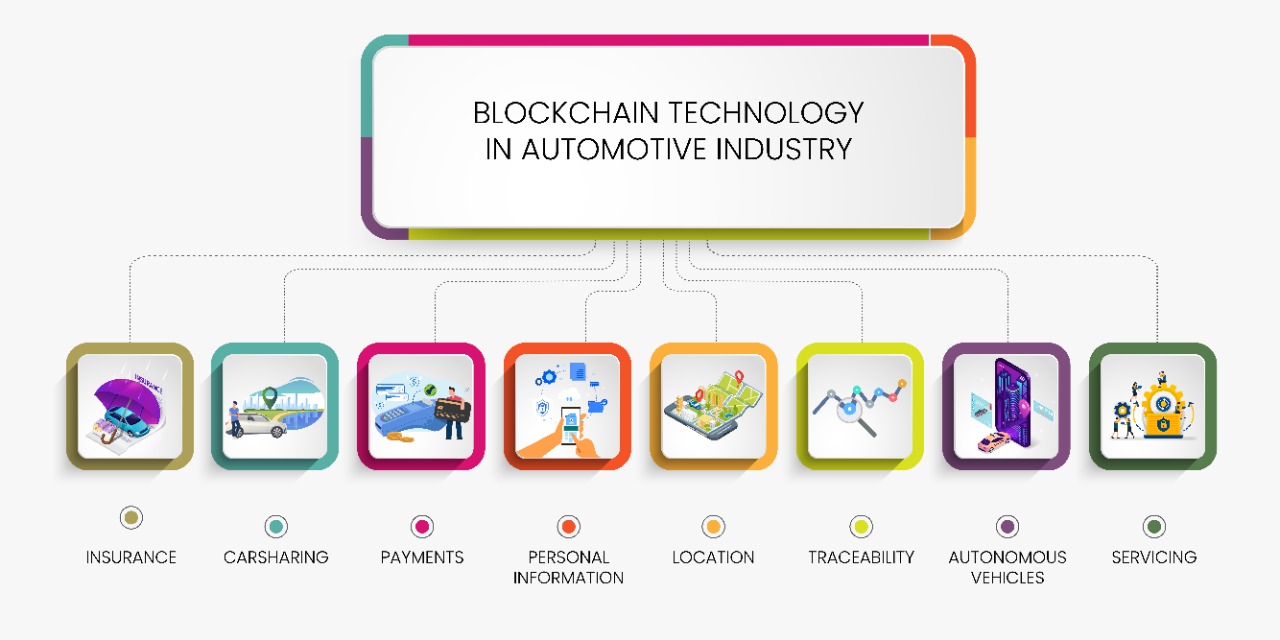- Blog
- September 14, 2021
Blockchain Technology in the Automotive Industry

- Blog
- September 14, 2021
Blockchain Technology in the Automotive Industry
Blockchain technology is always been associated with Bitcoin and cryptocurrencies. This thinking is fading away quickly as we are witnessing many other industry players adopting blockchain and its endless possibilities. The automotive industry is not far behind in unleashing the full potential of blockchain.
World-famous car manufacturing brands like BMW, GM, Ford are already making big bets on blockchain technology. For example, Ford is on a mission to improve air quality in Europe.
The role of blockchain in the automotive industry
Vehicles are gradually evolving into far more than just modes of mobility. Cars in the twenty-first century are mobile data centers with integrated sensors and disruptive technology that collect data about the vehicle. Blockchain has the ability to increase trust and collaboration among organizations, consumers, and even cars by providing more secure, traceable transactions and better access to and openness of information.It’s no surprise that automakers are paying attention to blockchain and making some strategic investments in this field. While blockchain has the potential to disrupt the status quo on its own, when combined with the IoT, artificial intelligence (AI), and big data, it has much more potential
How is the automotive industry leveraging blockchain technology?

Here are some instances of how blockchain is being used in the automotive industry:
- Insurance: The blockchain may be used to thoroughly verify and secure vehicle mileages, allowing drivers who don’t use their car often to obtain lower insurance.
- Carsharing: Vehicles on a timeshare basis are provided by an original equipment manufacturer (OEM). Transactions that take place between owners, operators, and third-party service providers are settled instantly utilizing a single-source, usage-based payment system, and trips are tracked on the blockchain.
- Payments: E-contracts are a big asset that blockchain helps to power since they allow for direct, secure money transfers from a buyer to a seller without the need for a bank or other intermediaries.
- Personal information: Driver information may be maintained safely and securely on the blockchain, allowing a carsharing vehicle to be immediately customized to a user’s preferences, including seat, mirror, temperature, and radio settings.
- Location: With RFID tags and data saved in the blockchain, fleet owners can track the location of all of their cars and employees. Particularly in the package delivery industry, this could lead to time and distance efficiencies.
- Traceability: Blockchain can be used in the supply chain to verify the source of materials used in the manufacturing of a car, all the way back to the raw material as soon as it is retrieved from the mine.
- Vehicle Recalls and History: The VIN of a car can be maintained in the blockchain, which means that if a recall is made, owners of the specific vehicles with a defect can be notified, substantially decreasing expenses for manufacturers and inconveniencing drivers.
- Autonomous Vehicles: Huge amounts of data must be processed, analyzed, and delivered safely and promptly for autonomous vehicles to be safe. The blockchain is a secure and dependable way to accomplish this.
- Servicing: With a simple scan of a QR code, a car’s service history may be stored on the blockchain, and the technology can be used to ensure that only original OEM-supplied parts are used to make repairs or replacements.
Final Synopsis
As the automotive industry moves toward self-driving, connected, and electrified vehicles (EV), blockchain may provide another way to maximize the benefits of these technologies. The most appropriate use cases appear to be supply chain, financial services, and the safe, secure sharing of driver or rider data.
Because of its infancy, there are still problems to iron out, but with the level of investment from across the sector, blockchain has the potential to cause substantial disruption. To win, you have to be in it, just like early Bitcoin investors, and we’ll be watching the technology’s uptake with curiosity to see who goes all in.




